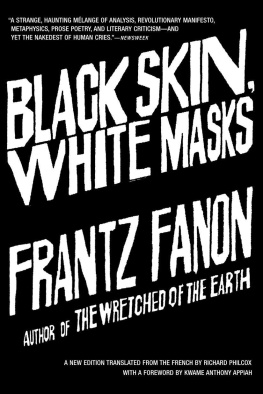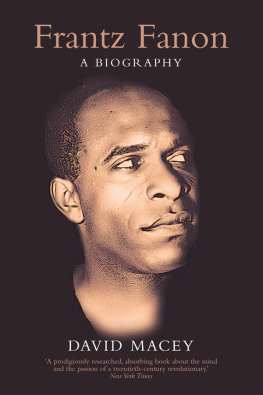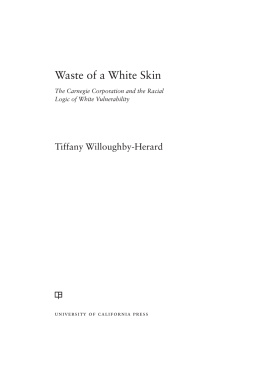BLACK SKIN, WHITE MASKS
Other Works by Frantz Fanon Published
by Grove Press:
The Wretched of the Earth
A Dying Colonialism
Toward the African Revolution
BLACK SKIN, WHITE MASKS
Frantz Fanon
Translated from the French by Richard Philcox

Copyright 1967 by Grove Press, Inc.
All rights reserved. No part of this book may be reproduced in any form or by any electronic or mechanical means, including information storage and retrieval systems, without permission in writing from the publisher, except by a reviewer, who may quote brief passages in a review. Scanning, uploading, and electronic distribution of this book or the facilitation of such without the permission of the publisher is prohibited. Please purchase only authorized electronic editions, and do not participate in or encourage electronic piracy of copyrighted materials. Your support of the authors rights is appreciated. Any member of educational institutions wishing to photocopy part or all of the work for classroom use, or anthology, should send inquiries to Grove/Atlantic, Inc., 841 Broadway, New York, NY 10003 or permissions@groveatlantic.com.
Originally published in French under the title Peau Noire, Masques Blancs, copyright 1952 by Editions Du Seuil, Paris.
Published simultaneously in Canada
Printed in the United States of America
Library of Congress Catalog Card Number 67-30411
ISBN: 978-0-8021-9769-3(e-book)
Grove Press
an imprint of Grove/Atlantic, Inc.
841 Broadway
New York, NY 10003
Distributed by Publishers Group West
www.groveatlantic.com
CONTENTS
Chapter One
The Black Man and Language
Chapter Two
The Woman of Color and the White Man
Chapter Three
The Man of Color and the White Woman
Chapter Four
The So-Called Dependency Complex of the Colonized
Chapter Five
The Lived Experience of the Black Man
Chapter Six
The Black Man and Psychopathology
Chapter Eight
By Way of Conclusion
FOREWORD
by Kwame Anthony Appiah
Frantz Fanon was born in Martinique in 1925 and went to school there first, before moving to metropolitan France to continue his education. During the Second World War, he served in the Free French Army, which took him for the first time to North Africa. After the war, he studied medicine and psychiatry at the University of Lyons, completing his training in 1951. Two years later he was appointed to run the psychiatry department of the Blida-Joinville hospital in Algeria; and he soon joined the Algerian liberation movement, the National Liberation Front (FLN), contributing to its underground newspaper, al-Moujahid. He was expelled from Algeria by the French authorities in 1957, moving before long to Tunisia, where he practiced psychiatry and continued to work for the FLN. In 1961, he was appointed ambassador to Ghana by the Algerian provisional government, but he died of leukemia that year.
Fanons short life would probably have been only a footnote to the end of Frances colonial empire in Africa if he had not written two books: Black Skin, White Masks, which you hold in your hand, and The Wretched of the Earth. In these books (and in his other writings), Fanon explored the nature of colonialism and racism, and the psychological damage they caused in colonial peoples and in the colonizer. He also wrote provocatively about the role of violence in the anticolonial struggles of the mid-twentieth century and his ideas were enormously influential on intellectuals around the world in the years after his death. There are three intertwined themes in Fanons writing: a critique of ethnopsychiatry (which aimed to provide an account of the mental life, in sickness and in health, of colonized peoples) and of the Eurocentrism of psychoanalysis; a dialogue with Negritude, then the dominant system of thought among black francophone intellectuals, in which he challenges its account of the mental life of black people; and the development of a political philosophy for decolonization that starts with an account of the psychological harm that colonialism had produced.
As the list of these themes makes clear, Fanons work is profoundly shaped by his training as a psychiatrist, and by his response to the work of European ethnopsychiatrists trying to understand the psychology of non-European peoples. But, like all African and Afro-Caribbean intellectuals in the francophone world in the mid-century, he was also molded by the ideas of the Negritude movement. In this, his first book, Black Skin, White Masks, published in 1952, Fanon asserted that what is called the black soul is a construction by white folk, claiming, in effect, that the purportedly essential qualities of the Negro spirit that were celebrated by the writers of Negritude were in fact a European fantasy. Fanon also argued against Negritude that its assumption of a natural solidarity of all black peoplein the Caribbean and in Africawas a political error. Far from needing to return to an African past, black intellectuals needed to adapt to modern European culture; and they needed to help change the everyday life of ordinary black people. And yet, despite all these criticisms, he conceded that Negritude could play an important role in freeing the native intellectual of dependence on metropolitan culture.
In this book, Fanon also develops an account of the psychological effects of racism based, in part, on his own experiences of life among the black middle class in the French Caribbean. The dominant colonial culture, he argued, identifies the black skin of the Negro with impurity; and the Antilleans accept this association and so come to despise themselves. Colonial women exhibit their identification with whiteness, for example, by attempting neurotically to avoid black men and to get close to (and ultimately cohabit with) white men; a process Fanon dubbed lactification. This self-contempt manifests itself in other ways: as anxiety, in the presence of whites, about revealing ones natural Negro inferiority; in a pathological hypersensitivity that Fanon dubbed affective erethism;; in an existential dread; and in a neurotic refusal to face up to the fact of ones own blackness. Black children raised within the racist cultural assumptions of the colonial system, can partially resolve the tension between contempt for blackness and their own dark skins by coming to think of themselves, in some sense, as white. (Hence the white masks of the title). Fanons approach in Black Skin, White Masks focuses on the problems of identity created for the colonial subject by colonial racism; and on the consequent need to escape from these neuroses, which colonialism had produced.
The passion and power of Fanons writing comes through forcefully in this new translation. We may no longer find the psychoanalytic framework as useful in understanding racisms causes and effects as he did. But the vigor of his evocations of the psychological damage wrought on many colonial peoplesand on the colonizers who oppressed themremains. And if we are no longer completely convinced by his theories, his work remains a powerful reminder of the psychological burdens that colonial racism imposed upon its victims. Yet, though Black Skin, White Masks is a searing indictment of colonialism, it is also a hopeful invitation to a new relation between black and white, colonizer and colonized: each, he says (on the books last page), must move away from the inhuman voices of their respective ancestors so that a genuine communication can be born. That message, alas, is also one that remains relevant today.
Next page








